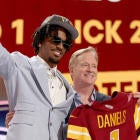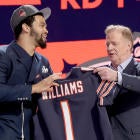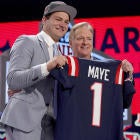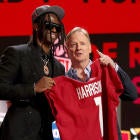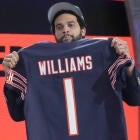
The NFL's financial landscape is being assessed through awards for the eighth straight year on CBSSports.com with the regular season in the books. These awards differ from the traditional NFL honors because they are from an economic perspective, emphasizing 2020 veteran acquisitions.
Players acquired by trades or in free agency can have a tremendous impact on an NFL team's fortunes. Rookies weren't given any consideration because their salaries are a function of draft position and the rookie wage scale. The same applies to players who signed restricted free agent tenders since the amounts are set by the NFL's Collective Bargaining Agreement. A runner-up is named when warranted.
Most Valuable Acquisition
Buccaneers head coach Bruce Arians was intent on upgrading at quarterback after going 7-9 in 2019 with Jameis Winston. Tampa Bay landed Brady with a fully guaranteed two-year, $50 million contract worth a maximum of $59 million with incentives.
Getting Brady has paid immediate dividends. Brady was the catalyst for the Buccaneers transforming from playoff pretender to Super Bowl contender. A 13-year playoff drought ended with Tampa going 11-5 in the regular season to secure an NFC wild-card playoff berth. Three straight road playoff wins have put the Buccaneers in Super Bowl LV.
Brady continued to defy the odds by keeping Father Time at bay. The 43 year old completed 65.7 percent of his passes for 4,633 yards (third in the NFL), with 40 touchdowns (second in NFL) and 12 interceptions to post a 102.2 passer rating (ninth in NFL). Brady's 40 touchdown passes were his second best single season mark and his most since 2007 when he had a career high 50.
There are $4.5 million of annual incentives in Brady's contract. $2.25 million are for individual performance. The remainder are based on Tampa Bay's playoff success.
Brady earned $562,500 each for ranking in the NFL's top five in touchdown passes (or throwing at least 25 touchdowns) and passing yards. Because Brady participated in least 75 percent of Tampa Bay's offensive plays (95.43 percent playtime), he made $500,000 for the Buccaneers qualifying for the playoffs, another $250,000 for the team beating the Washington Football in a wild-card playoff game, an additional $500,000 by eliminating the Saints in the divisional playoffs and an extra $500,000 by winning the NFC Championship Game. A Super Bowl LV victory is also worth $500,000. Brady has earned $2.875 million of the $4.5 million in incentives to date.
Runner Up: Stefon Diggs, WR, Bills

With The First Pick Newsletter
With The First Pick Newsletter
Prepare for the upcoming NFL Draft with the day’s big stories + mock drafts, big board updates and more.
Thanks for signing up!
Keep an eye on your inbox.
Sorry!
There was an error processing your subscription.
Least Valuable Acquisition
The Titans signed Beasley to a one-year, $9.5 million contract, which included a $6 million signing bonus, to improve a weak pass rush. The deal was worth as much as $12 million because of $2.5 million in incentives. Inexplicably, Beasley didn't show up for the first 10 days of training camp, which resulted in $500,000 of fines and voided the guarantees of his $3.5 million base salary.
The Titans released Beasley in early November seven games into the season. Beasley was a non-factor in the five games he played. He failed to generate any sacks and only had seven quarterback pressures (combined sacks, quarterback hurries and quarterback hits) in limited action. Beasley made $7,852,941 during his short stint with the Titans.
Offensive Signing of the Year
The Titans designated Henry as a franchise player for $10.278 million last March after a 2019 season where he led the NFL in rushing (1,540 yards) and tied for the league's most rushing touchdowns with 16. Henry really made his mark in the playoffs during the Titans' run to the AFC Championship Game. He became the first player to ever have two games of at least 180 rushing yards in the same postseason. Henry also set an NFL record for the most rushing yards during a playoff run (not including the Super Bowl) with 446. His 148.7 rushing yards per game this postseason is the fourth best mark ever in any single playoffs.
The Titans signed Henry to a four-year, $50 million contract (with an additional $1 million in incentives) right before the July 15 long-term deal deadline for franchise players. The first two years worth $25.5 million are fully guaranteed.
Henry picked up where he left off during the playoffs last season. He became the eighth player in league history to rush for 2,000 yards in season en route to winning his second straight rushing title. Henry's 2,027 yards are fifth on the all-time list. He also led the NFL with 17 rushing touchdowns. Henry is the first player with back-to-back 1,500 rushing yard seasons since Larry Johnson accomplished the feat in 2006.
Runner Up: Tom Brady, QB, Buccaneers
Defensive Signing of the Year
The Colts gave the 49ers the 13th overall pick in the 2020 NFL Draft to get Buckner, who was scheduled to play under a $12.378 million fifth-year option. Buckner was given a four year, $84 million contract extension averaging $21 million per year with $56.378 million of guarantees in connection with the trade. The deal made Bucker the NFL's second highest paid interior defensive lineman.
Buckner's 9.5 sacks were third in the NFL among interior defensive linemen behind Aaron Donald and Leonard Williams, who had 13.5 and 11.5 sacks respectively with the Rams and Giants. After being snubbed for the Pro Bowl, Buckner earned first team All-Pro/All-NFL honors from the Associated Press and Pro Football Writers of America.
Biggest Steal
Agholor signed a one-year deal worth $1,047,500 after a disastrous 2019 season with the Eagles playing out his rookie contract. He benefitted tremendously from the change of scenery. Agholor helped fill the void created by Tyrell Williams missing the season because of a shoulder injury. After primarily being used in the slot the last couple of years in Philadelphia, Agholor showed his deep threat capabilities. He was second in the NFL with 18.7 yards per catch. He had 48 receptions for 896 yards with eight touchdowns. The 896 yards are a career high. Agholor's production was comparable to or better than some wide receivers making between $9.5 million and $10.75 million per year (Tyler Boyd, Jamison Crowder, Sterling Shepard).
Runner Up: Jason Verrett, CB, 49ers
Best Use of a Contract Year
Bolles was a disappointment in his first three NFL seasons. The 2017 first round pick's claim to fame was leading the NFL in holding penalties in each of those seasons.
Bolles' struggles led to the Broncos declining a fifth year option for him in 2021 worth $11.064 million resulting in 2020 becoming his contract year. Denver's plan was for Elijah Wilkinson to compete with Bolles at left tackle until right tackle Ja'Wuan James opted out of the season because of concerns about COVID-19. This meant Bolles would remain as Denver's starting left tackle.
Bolles elevated his play to a Pro Bowl level. In turn, the Broncos signed him to a four-year, $68 million contract extension with $40 million of guarantees in late November, making him the NFL's fifth highest paid offensive lineman at $17 million per year.
Runners Up: Trey Hendrickson, Edge, Saints
Worst Use of a Contract Year
A lack of interest after Newton's release by the Panthers in March led him to sign a one-year deal with a base value of $1.75 million worth up to $7.5 million through incentives. Newton appeared to be on his way to resurrecting his career after being plagued by foot and shoulder injuries over the previous two seasons when he tested positive for COVID-19.
Newton performed so poorly initially upon returning to action from the coronavirus he admitted he could be benched with continued subpar performances. His play improved somewhat but nobody was confusing the 2020 Newton with the 2015 NFL MVP version. In fairness, Newton's offensive weapons left a lot to be desired. Tom Brady started showing his age in 2019, his last for the Patriots, with a similar group. Newton completed 65.8% percent of his passes (242 of 368 attempts) for 2,657 yards, with eight touchdowns and 10 interceptions to post an 82.9 passer rating in 15 games. He remained one of the NFL's biggest running threats at quarterback by rushing for 592 yards and scoring 12 touchdowns.
Newton failed to re-establish himself as a legitimate starting quarterback. The Patriots are expected to go in another direction next season. Newton's consolation prize is earning $2 million of his incentives for taking 86.65 percent of New England's offensive snaps.
With there potentially being unprecedented passer movement in the upcoming offseason, Newton will probably be left standing once the quarterback musical chairs stops. His best chance of getting a starting spot may be a reunion with his former Panthers head coach Ron Rivera on the Washington Football Team. The most likely scenario is Newton settling for the best backup situation that could eventually provide him a chance to play should the starting quarterback falter.
Runners Up: Vic Beasley, Edge, Titans; Jadeveon Clowney, Edge, Titans; A.J. Green, WR, Bengals
Best Contract Extension (for a team)
George Kittle spearheaded a long overdue re-set of a stagnant tight end market in August with the five-year, $75 million extension averaging $15 million per year he received from the 49ers. His $40 million in overall guarantees and $30 million fully guaranteed at signing are both the most ever in an NFL contract for a tight end.
Within a few hours of Kittle's deal being announced, Kelce signed a four-year, $57.25 million extension averaging $14,312,500 per year. The two deals couldn't be more different although Kelce has $23 million in guarantees where $21 million was fully guaranteed at signing.
Kelce had two years remaining on his contract for $18.25 million, which was signed in 2016. His deal set to expire after the 2021 season.
The Chiefs got an extremely team friendly structure. A "pay as you go" contract structure was used where a player's cash and salary cap numbers are the same in each contract year because there isn't a signing bonus that would be prorated over the life of the contract (for a maximum of five years).
Kelce's 2020 compensation stayed the same at $9.25 million, which is unusual for a deal of this magnitude. He is only receiving $4.25 million more over his remaining two years than if he played out the 2016 extension.
Surprisingly, Kelce has minimal guaranteed money after 2021. Only $2 million of his $6.5 million 2022 base salary, which was guaranteed for injury upon signing, becomes fully guaranteed that March on the third day of the league year. This entire $6.5 million really should become fully guaranteed this March on the third day of the 2021 league year.
The Chiefs have maximum salary cap flexibility because of how Kelce's contract is structured. Should Kelce's skills rapidly start to diminish, Kansas City can exit the deal as early as 2022 without any salary cap consequences.
The deal is incredibly back loaded. Kelce has $11.75 million of new money through his first new contract year of 2022. It would have been $11.65 million for Kansas City to designate Kelce as a franchise player in 2022 if he played out his contract, which was going to be 120 percent of his 2021 cap number in the 2016 extension.
Kelce has $25 million in new money over the first two new contract years (through 2023). The $25 million is $630,000 less than Kelce would have made playing under two straight franchise tags in 2022 and 2023.
Quite frankly, Kelce didn't get enough money in his remaining contract years or security to give up four years. The Chiefs essentially have four team options with Kelce starting in 2022, his first new contract year.
To add insult to injury, Kelce had the finest season ever for a tight end. He set the single season receiving yards record for a tight end with 1,416 yards. Kelce's 105 receptions are the fourth most a tight end has had in a season. His 11 touchdown catches tied for the league lead among tight ends.
By being patient, Kelce would have had the leverage to surpass Kittle as the highest paid tight end in league history this upcoming offseason after his incomparable production. Kelce also became the first tight end to ever have two seasons in which 100 catches, 1,000 receiving yards and 10 touchdown receptions were reached. The only other time this feat has been accomplished was by Dallas Clark with the Colts in 2009. Instead, Kelce's $14,312,500 average yearly salary is likely to serve as a ceiling with tight ends for the foreseeable future.
Runner Up: Patrick Mahomes, QB, Chiefs
Worst Contract Extension (for a team)
Technically, Hill didn't sign a contract extension. The Saints placed a $4.641 million restricted free agent (RFA) tender on Hill entitling them to a first round pick as compensation if an offer sheet signed with another team wasn't matched. After Hill didn't generate any interest during the RFA signing period and his exclusive negotiating rights reverted back to the Saints, he was given a two-year, $21 million contract (worth up to $22 million through incentives) with $16 million fully guaranteed in late April.
Having Hill under contract for more than just his $4.641 million RFA tender was a luxury not a necessity. In essence, the Saints valued the one unrestricted free agent year Hill gave up at $16.359 million, which is an exorbitant amount for someone who had been a jack of all trades contributor. In addition to being a standout on special teams, Hill lined up at running back, wide receiver and tight end as well as taking snaps under center in wildcat formations.
Hill started four games at quarterback during the 2020 regular season because of Drew Brees' broken ribs and a collapsed lung. Although Hill completed 72.7 percent of passes and the Saints went 3-1, the jury is still out on him being a full-time starting quarterback because of his decision making on passing plays and issues with ball security.
The Saints have the NFL's most challenging salary cap situation currently projecting to a $112.2 million overage according to NFLPA data if the 2021 salary cap is set at the $175 million floor agreed to by the NFL and NFLPA. Hill's 2021 cap number is $16.159 million with his $12.159 million salary fully guaranteed.
Had Hill played on the RFA tender, the Saints would have more flexibility at quarterback for next season. It's highly unlikely he would have generated a lot interest as unrestricted free agent given the potential quarterback supply and the 2021 salary cap likely decreasing from the current $198.2 million level.
Assuming Brees retires as expected, Hill likely could have been re-signed to one-year deal for less than $8 million to compete for the starting quarterback job. Nick Foles took a pay cut to $8 million with incentives after his offseason trade to the Bears, who weren't sold on Mitchell Trubisky. The most the Saints would have needed to pay Hill over the two year period would have been $12.5 million rather the $21 million. Hill's 2021 cap number could have been in the $2.5 million neighborhood with a willingness to add four voiding or dummy years to the one year contract so his signing bonus could be prorated over five years. It also would been easier to sign another quarterback to challenge Hill or make a run at an established quarterback via trade.






























